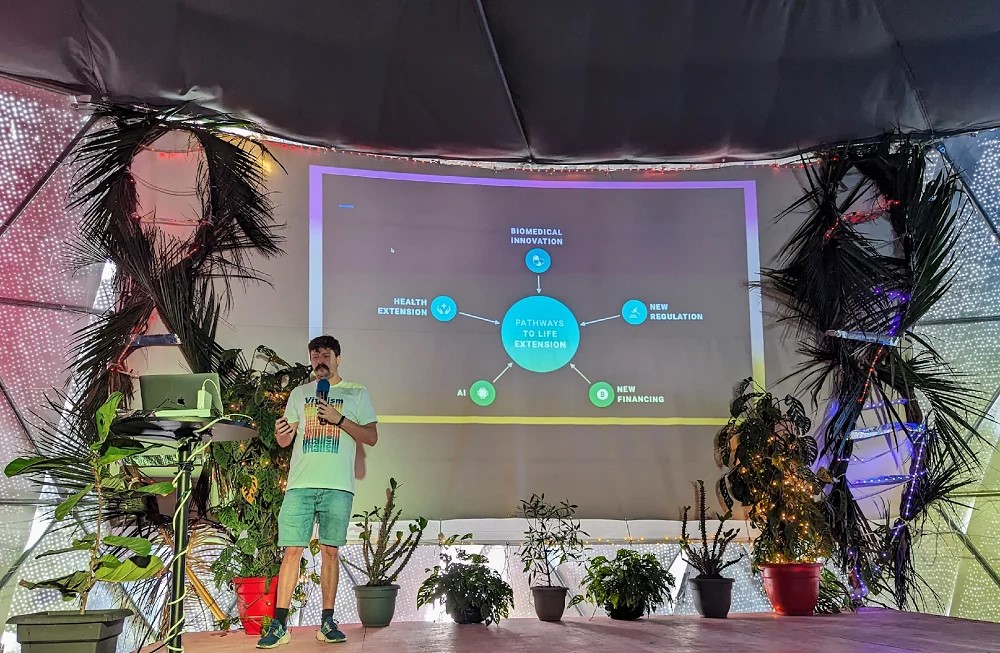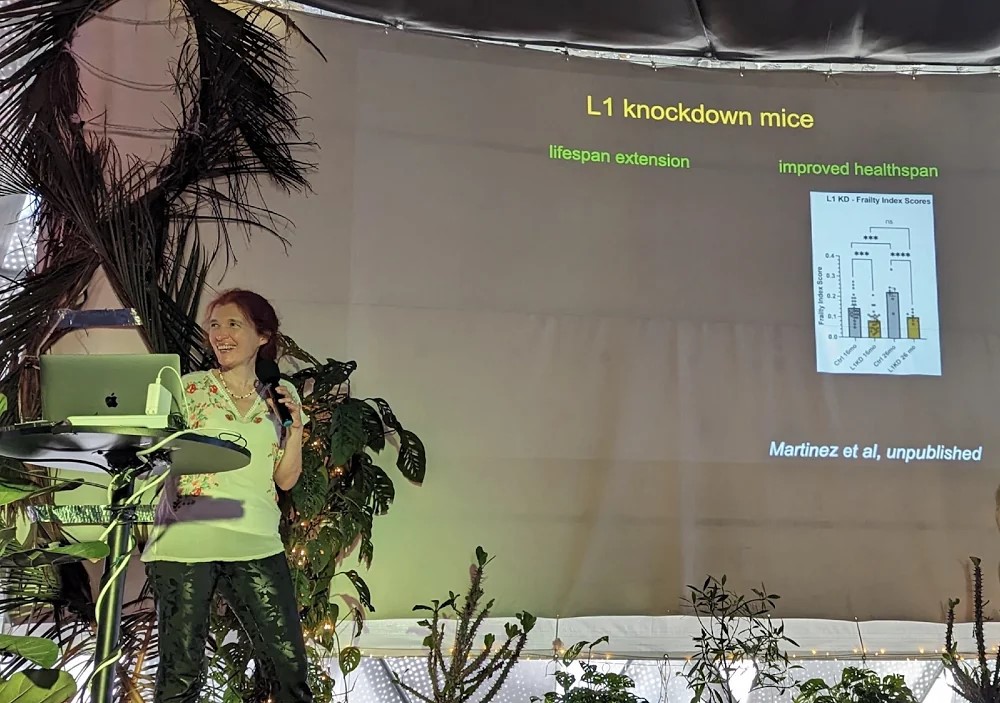Grandiose Life Extension Dreams Meet Lax Scientific Scrutiny in Honduras
A longevity conference in the pop-up longevity city of Vitalia in Honduras showcased research on pro-longevity molecules like fucoidan as well as organ replacement techniques.
Highlights
- National University of Singapore’s Max Unfried highlights the VitaDAO Life Extension Conference’s goals of speeding up the discovery of longevity interventions.
- The University of Rochester’s Vera Gorbunova presents research on longevity extension using the seaweed-derived anti-inflammatory fucoidan.
- Justin Rebo, CEO of Kind Biotechnology, gives a snapshot of current ideas in the realm of organ replacements to prolong lifespan.
The VitaDAO Life Extension Conference, centered on speeding up the discovery of longevity interventions, was held in February 2024 in the pop-up longevity city of Vitalia on the island of Roatán, Honduras. Presenters at the conference hailed from various academic and private institutions with the common goal of developing ways to help people prolong their lifespans and disease-free years (healthspans).
One of the conference’s organizers, Max Unfried, a PhD student at the National University of Singapore, set off the conference by describing Vitalia’s overarching goals. According to Unfried, Vitalia wants to speed up the discovery of longevity interventions that extend people’s lifespans. To achieve this, Vitalia seeks to develop new research ideas and alternative therapy approval pathways, outside the realm of FDA regulation, however long their odds of success may seem. Vitalia also seeks more public support for the development of longevity therapy research and the quest for attacking aging from multiple angles simultaneously.
Fucoidan, Hyaluronic Acid, and Future Organ Replacement Therapies May Prolong Disease-Free Life
Longevity scientists like the University of Rochester’s Vera Gorbunova presented research at the conference on the seaweed-derived anti-inflammatory compound fucoidan. Fucoidan boosts the activation of the cellular protein SIRT6 that functions in DNA repair and suppresses inflammation. Interestingly, it also extends the healthspan of mice and lifespan in flies.
Gorbunova also presented some of her research on long-lived organisms like the naked mole rat. This species can live beyond 37 years, contrasting with the lifespan of similar-sized species like mice that live ~2.5 years. She found that their cells produce a type of hyaluronic acid — a molecular component of the structural scaffold for cells (the extracellular matrix). Virtually all cells produce hyaluronic acid in vertebrates, yet naked mole rat cells make a form of hyaluronic acid molecules that is larger — high molecular mass hyaluronic acid — possibly allowing naked mole rats to avoid cancer.
When Gorbunova genetically altered mice so that they produce the naked mole rat version of hyaluronic acid, they lived longer and had a lower incidence of cancer. For application purposes, although many skin cosmetic products contain hyaluronic acid, one can also purchase it for oral supplementation. As such, supplementing with hyaluronic acid, especially the high molecular mass form, may prolong the number of years you live in good overall health.
Another presentation at the Vitalia conference came from Justin Rebo, CEO of Kind Biotechnology, who proposes organ replacement for lifespan extension. Organ replacement would take place when particular organs start losing their functional capacity.
This presents a very difficult task since organ supplies are relatively low. Moreover, current organ replacement techniques come with frequent recipient organ immune system rejection. Furthermore, 3D organ printing methods fall short of being able to produce complex organs, with a possible exception being the liver.
To address these confounding issues, Rebo suggests growing all organs simultaneously within the same device (whatever that device may look like in the future). Along these lines, every organ needs every other organ to develop, according to Rebo. The problem with this proposal is that sets of organs that grow in the body come with an attached nervous system, including the brain and spinal cord. However, he thinks that certain genetic modifications may solve this issue, giving us new sets of organs that may be implanted into those seeking organ replacement.
While this idea may sound unsettling, longevity researchers like Rebo are weighing ethical concerns against the arduous pain and suffering associated with aging and death. As such, approximately 70% to 80% of the population die from aging, according to Rebo. In that sense, the pain and suffering associated with aging and the potential to alleviate age-related agony with organ replacement may outweigh ethical considerations.
Presentations from Gorbunova and Rebo are just two of about 20 presentations given during the Vitalia longevity conference. Many of the others can be found with the following link: (1) Vitalia City – YouTube.
Vitalia’s Honduran Location Allows Unfettered Research Without FDA Oversight
Vitalia’s location within the precincts of the longevity-focused community Próspera on the island of Roatán in Honduras is interesting in and of itself. Founders of Próspera, like Venezuelan entrepreneur Erick Brimen, started it as a free economic zone where researchers and biotech companies can cut human trial costs and avoid FDA regulation. Also, Próspera has its own legal system such as cryptocurrency-based property rights. According to Vitalia co-founder Niklas Anzinger, Próspera’s unique regulatory climate has made ventures like Vitalia a paragon of medical freedom and regulatory flexibility.
One potential benefit that longevity researchers and biotech companies get in Próspera is that they can sell therapies to clients after completing Phase I trials. Phase I trials only establish the safety of a therapy, not its efficacy as shown with Phase II trials.
With its freedom from FDA oversight in Próspera, Vitalia has already garnered 38 companies working within the city. It has also enlisted between 25 and 30 permanent residents.
Over the next two years, Vitalia is planning to grow to include 500 to 1,000 residents. By 2034, Vitlia founders plan to produce 1,000+ products from Vitalia, have over 100,000 residents, and possess $50 billion in equity and land.
Determining Who Verifies New Therapy Safety and Effectiveness Without FDA Oversight
The pop-up of longevity-focused communities like Vitalia avoiding FDA oversight at locations outside of the US begs the question of whether their lax regulations will lead to unsafe and ineffective therapies. Although Vitalia says that therapies accepted for marketing via their community must pass phase I trials for safety, it is unclear whether those phase I trials are conducted under the same standards as with the FDA. Furthermore, Vitalia does not require phase II trials before new longevity therapy use, which shows effectiveness. Thus, it would be difficult to tell whether some vendors may exploit Vitalia’s lax regulatory system to peddle “snake oil” products with no human benefits.


